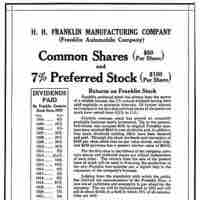Section 3
Rules and Rights of Common and Preferred Stock
By Boundless
In the cases of bankruptcy and dividend distribution, preferred stock shareholders will receive assets before common stock shareholders.

Common stock generally carries voting rights, while preferred stock does not; however, this will vary from company to company.

Preferred shares have numerous rights which can be attached to them, such as cumulative dividends, convertibility, and participation.

New shares can be purchased on exchanges and current shareholders will usually have preemptive rights to newly issued shares.

Preferred stock can include rights such as preemption, convertibility, callability, and dividend and liquidation preference.

Common stock, preferred stock, and debt are all securities that a company may offer; each of these securities carries different rights.